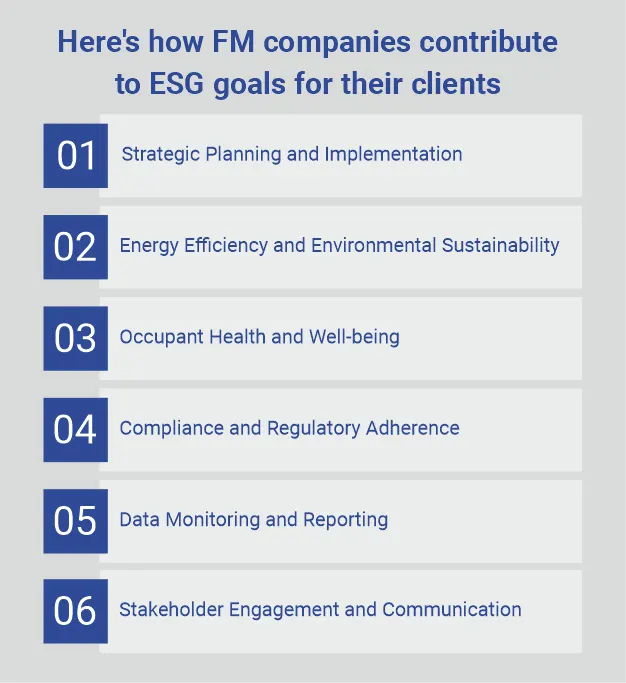In recent years, the concept of Environmental, Social, and Governance (ESG) criteria has gained significant traction in the corporate world. ESG considerations are now fundamental to business strategies, reflecting a broader recognition of the importance of sustainability, social responsibility, and ethical governance practices. Amidst this paradigm shift, facility management companies in India emerge as pivotal players in helping their clients navigate and achieve their ESG goals.
ESG goals encompass a wide array of objectives, ranging from reducing carbon emissions and energy consumption to enhancing workplace diversity and ensuring ethical supply chain practices. Facility management companies, responsible for overseeing the operational and maintenance aspects of buildings and facilities, play a crucial role in aligning their services with their clients' ESG objectives.
Facility management service providers play a crucial role in helping their clients meet Environmental, Social, and Governance (ESG) goals. Their responsibilities extend beyond basic maintenance and operational tasks to include strategic planning, implementation of sustainable practices, and fostering a culture of corporate responsibility.
As organizations strive for efficiency, cost-effectiveness, and sustainability, the demand for skilled professionals in facility management continues to rise. This article delves into the various employment opportunities within the facility management industry and outlines compelling reasons why individuals should consider pursuing a career in this field.
Understanding ESG in Facility Management

1. Understanding ESG in Facility Management:
Facility management encompasses a wide range of activities that directly impact the environment, from energy consumption and waste management to building materials and resource utilization. By prioritizing energy efficiency, renewable energy adoption, water conservation, and waste reduction, facility managers can minimize environmental impact and contribute to mitigating climate change.
2. Social Responsibility:
Facilities are not just physical spaces; they are dynamic environments where people work, learn, and interact. Therefore, fostering social responsibility within facilities is paramount. This includes promoting health and safety, ensuring accessibility and inclusivity, supporting workforce diversity, and engaging with local communities. Facility managers play a crucial role in creating safe, healthy, and equitable spaces that prioritize the well-being of occupants and stakeholders.
3. Governance and Ethics:
managers are responsible for upholding ethical standards in procurement, vendor management, and operational practices. This involves promoting transparency, adhering to regulatory requirements, and implementing robust governance structures to ensure compliance and mitigate risk.
Here's how facility management companies contribute to advancing ESG goals for their clients:
1. Strategic Planning and Implementation:
Facility management service providers work closely with their clients to understand their ESG objectives and integrate them into facility management strategies. This involves conducting thorough assessments of existing operations, identifying areas for improvement, and developing tailored action plans to achieve ESG goals. Whether it's reducing energy consumption, enhancing indoor air quality, or promoting workplace diversity, facility management providers play a key role in translating ESG aspirations into tangible initiatives.
2. Energy Efficiency and Environmental Sustainability:
One of the primary ways facility management service providers contribute to ESG goals is by implementing energy-efficient practices and promoting environmental sustainability. This includes optimizing building systems for energy efficiency, such as HVAC, lighting, and water management, as well as implementing renewable energy solutions where feasible. Facility managers also oversee waste management and recycling programs to minimize environmental impact and promote resource conservation.
3. Occupant Health and Well-being:
Facility management service providers prioritize the health and well-being of facility occupants by maintaining indoor environmental quality standards. This involves regular inspections, monitoring of air quality, and implementation of green cleaning practices to create a healthy and productive work environment. By ensuring a safe and comfortable workplace, facility managers contribute to the social responsibility aspect of ESG goals and support the overall well-being of occupants.
4. Compliance and Regulatory Adherence:
Facility management service providers help their clients navigate complex regulatory requirements and ensure compliance with relevant ESG standards and certifications. This includes staying up-to-date with environmental regulations, building codes, and industry best practices to minimize risk and avoid penalties. By proactively addressing compliance issues and implementing sustainable practices, facility managers support their clients' commitment to good governance and ethical business conduct.
5. Data Monitoring and Reporting:
Effective monitoring and reporting are essential for tracking progress towards ESG goals and demonstrating accountability to stakeholders. Facility management service providers leverage data analytics and performance tracking tools to measure key performance indicators related to energy usage, waste generation, and indoor air quality. By providing regular reports and insights, facility managers enable clients to make informed decisions, identify areas for improvement, and showcase their commitment to ESG principles.
6. Stakeholder Engagement and Communication:
Facility management service providers serve as intermediaries between clients and various stakeholders, including occupants, suppliers, regulators, and community members. They facilitate communication and engagement initiatives to solicit feedback, address concerns, and promote transparency. By fostering positive relationships with stakeholders, facility managers enhance trust and collaboration, which are essential for achieving ESG goals and creating shared value.
In summary, facility management service providers in India play a multifaceted role in helping their clients meet ESG goals. From strategic planning and implementation to energy efficiency, occupant health, compliance, data monitoring, and stakeholder engagement, facility managers are instrumental in driving sustainable practices, fostering social responsibility, and promoting ethical governance within built environments. By aligning their services with ESG objectives, facility management service providers contribute to building a more sustainable, resilient, and responsible future for their clients and society as a whole.
Through strategic partnerships and proactive initiatives, facility management service providers can empower their clients to not only meet but exceed their ESG objectives, creating lasting value for society and the planet.
Having FFServices as your Integrated Facility Management service provider, clients can smoothly navigate the journey towards achieving their ESG goals, ensuring a sustainable, responsible, and prosperous future for all stakeholders involved.
Industries we serve:
Automobile | Ancillary | Manufacturing | Pharmaceutical | healthcare | Oil and Gas | FMCG | Education | Real Estate | Commercial
Also read: Exploring Employment Opportunities in the Facility Management Industry

